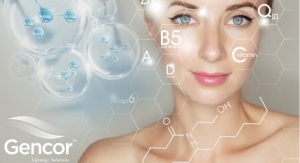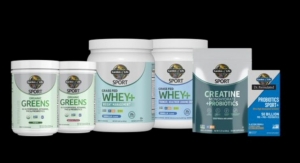By Melissa Kvidahl, Contributing Writer07.05.17
After years of steady growth, the U.S. facial skin care and anti-aging market hit a bit of a wall, according to a June 2016 report from Mintel. The silver lining, the market research firm said, is that the industry can get back on track if manufacturers answer consumer calls for natural products, as concerns surrounding chemicals, pollution, and unfamiliar ingredients grow.
Even better news: the report showed that consumers are done looking for the topical ointment that can magically turn back the clock. Those surveyed agreed that lifestyle factors like hydration and diet have a bigger impact on the skin’s appearance than the use of topical products. Indeed, it seems the tide has turned toward nutrition. And this is great news for the supplement market.
Dietary supplements for skin health are on the rise, according to a new study from Lycored, Orange, NJ. Two thirds of consumers said they consider the concept of taking a supplement for skin care as normal, and four in 10 millennials (ages 18-35) said they have already used a supplement to benefit their skin health at some point.
“This demand is being led by the growing awareness and understanding among consumers that wellness and beauty require a holistic approach,” said Golan Raz, vice president of health and nutrition at Lycored.
This holistic approach and subsequent focus on natural products is a trend that arguably started in the food aisles of a natural or grocery store, but has migrated to other product categories as consumers start to realize that health isn’t just about what foods they eat but also what products they apply and what supplements they take. “Consumers have been increasingly educated, and understand everything that goes into their bodies and the ‘benefits’ they provide,” said Lisa Mack, director of marketing at Connoils, LLC, Waukesha, WI. That’s why food-related marketing terms like natural, plant-derived, organic, and non-GMO are increasingly in-demand when it comes to skin health products.
Growing Market
As manufacturers and brands meet this demand, the market has grown. According to SPINS, sales of herbs, homeopathic products, vitamins, and supplements marketed for skin, hair, and nails grew about 3% between March 2016 and March 2017. In the natural channel alone, that growth approached 12%, showing that consumers still seek out these kinds of products in specialty channels with knowledgeable staff, as opposed to mass market retailers (where growth was just about 1.5%). According to Euromonitor International, the U.S. market for dietary supplements positioned for beauty specifically, grew about 10% between 2015 and 2016 to reach a value of about $84 million.
“There is a growing population of beauty-conscious individuals looking for alternatives to conventional topical skin care delivery systems that are reliable, natural, safe, and cost-efficient,” explained Shaheen Majeed, marketing director at Sabinsa Corporation, East Windsor, NJ. “Prescription medications and high cost medical procedures are viewed as a last resort.”
But consumer trends are just part of the equation. According to Lynda Doyle, senior vice president of global marketing at OmniActive Health Technologies, Morristown, NJ, another reason for this growing market is that the skin health category itself has expanded; it’s no longer just about anti-aging, but rather has broadened to focus on myriad issues like uneven skin tone, hyperpigmentation, and others. Additionally, whereas sun and UV protection is a clear cornerstone of this market, new products also focus on preventing damage from pollutants as well as IR and blue light, said Stefano Togni, head of cosmetic division, business development and licensing at Italy-based Indena. And these new approaches present opportunities for formulators to appeal to an ever-widening audience.
While women are typically considered to be the main consumers in the skin health nutraceutical category, the base is widening. Mr. Majeed said there is growing interest among the male population, since people of all genders get older and notice the signs of aging, and want to reverse them. Plus, Mr. Togni pointed out,some men would likely prefer to take care of their skin with a supplement rather than apply a topical treatment.
There’s also growing interest among younger consumers, according to Sebastien Bornet, vice president of global sales and marketing at Switzerland-based Horphag Research. “Traditionally, women over the age of 35 have driven category growth.” Today, Mr. Bornet sees “significant growth in the skin health market from younger men and women as more young individuals become interested in starting skin health routines early to prevent skin issues later in life.”
But skin health supplements are also reaching a wider audience because, unlike topical products, supplements in this area have a multitude of benefits that cross categories. Wellnex collagen peptides from Nitta Gelatin, Morrisville, NC, for example, have been proven to reduce the appearance of fine lines and work from the inside-out to increase the moisture and elasticity of skin.
However, as Katie Stevenson, business development manager pointed out, “collagen’s benefits are not limited to the skin health category. According to studies published by scientists at Nitta Gelatin, collagen has been linked to joint and bone health benefits, just to name a few.” So, in this case, consumers shopping the joint health aisle will be introduced to and educated on the skin health benefits of collagen, as well.
Similarly, Lycored’s Mr. Raz explained, supplement formulators are taking skin health into account when they’re developing products for other categories. “As an example, sports nutrition products are becoming an interesting platform for ingestible skin care technologies,” he said. “The idea behind this kind of innovation is that people who are routinely training outside are exposed to sun and weather and are in need of greater [skin] protection.” As a result, sports nutrition product formulators are looking to skin health ingredients to check all the boxes for their consumers and, along the way, are introducing them to a new category of supplements.
Ingredients & Applications
Because the benefits of skin health supplements run the gamut from minimizing wrinkles to sun protection, there are all kinds of ingredients at play and a wide range of considerations for the formulators who use them.
Antioxidants are still a popular route for this category, with many ingredient suppliers touting their benefits for the skin. For example, Indena offers olive-fruit-based options for sun protection and grape seed and Centella asiatica extracts for skin elasticity. The ingredients are appropriate for use in liquids, beverages, sachets, and other deliveries.
Last December, Lycored published a new double-blind, placebo-controlled trial that showed the effect of lycopene and lutein on skin health. Volunteers were split into four groups, beginning treatment with either lycopene-rich tomato nutrient complex or lutein and then switching to placebo, or vice versa (beginning with placebo then switching to the active treatment). Researchers found that the tomato extract completely inhibited UVA1 radiation, no matter the sequence, whereas lutein provided sufficient protection if it was taken in the first period.
OmniActive Health Technologies recently completed a study examining its ingredient Lutemax 2020, a naturally-derived marigold extract packed with lutein and zeaxanthin. The study showed that just 10 mg of the ingredient for 12 weeks demonstrated a combination of benefits including increased overall skin tone, skin lightening, minimal erythema, and skin elasticity. “And unlike other carotenoids—like beta-carotene—Lutemax 2020 does not lead to carotenoderma, yellowing of the skin from supplementation,” said the company’s Ms. Doyle.
Collagen is another tried and true ingredient when it comes to skin health, but suppliers are getting creative with new potential applications.
GELITA, Sioux City, IA, offers VERISOL, an ingredient made from collagen peptides that has been shown to reduce wrinkles, improve skin elasticity, and reduce cellulite with a 2.5-gram dose. VERISOL is non-allergenic and appropriate for innovative formulations from dairy products and protein bars to drinks and dietary supplements.
“The factor that should be kept in mind is that collagen is not a magic bullet—it works over time, and the effects are apparent, but it should be continually used moving forward,” said Nitta Gelatin’s Ms. Stevenson with regard to collagen supplements and Wellnex. “Additionally, for developers and formulators, applications are not limited to powder beverages.” Ms. Stevenson explained that new and innovative deliveries appropriate for collagen supplementation include shots, bars, gummies, tablets, and more. “There are so many possibilities for this ingredient.”
Marketing Considerations
Formulators that choose ingredients like Pycnogenol French maritime bark extract from Horphag Research are well poised to appeal to an educated consumer base. “They’re doing more research at the point of purchase on the ingredients listed in products to decide which product best suits their needs,” said Mr. Bornet, adding that Pycnogenol has been shown to increase skin hydration, improve elasticity, stimulate production of hyaluronic acid, and selectively bind to collagen and elastin to reduce the appearance of fine lines and wrinkles. “Product developers should consider these consumer habits when formulating new products, and look toward patented, standardized ingredients, like Pycnogenol, that have years of research supporting their benefits.”
It’s also critical to translate strong research into equally strong marketing messaging, according to OmniActive’s Ms. Doyle. She recommended highlighting research that supports an ingredient’s proven benefits over a specific period of time so that consumers know when to expect results.
“Consumers in this category are willing to pay for quality and efficacy, as the benchmark is topical cosmetic products,” Lycored’s Mr. Raz agreed. “This is how important research is for this category.”
Products that can carry familiar terms like natural, plant-derived, organic, or non-GMO will also resonate with consumers, said Connoils’ Ms. Mack. And this makes sense, as nutraceutical consumers by definition are either abandoning or, more likely, supplementing their topical regimen with an ingestible ingredient because they know the value of what they put in their bodies. So they’ll expect the best.
Going forward, Ms. Doyle predicted that whole body skin nutrition—that is, products designed for the whole body rather than those focused on face, neck, and arms—will make waves in the nutraceutical category “as supplements can provide a convenient way for consumers to get skin health and beauty support for the entire body.”
Experts agreed that multi-product kits that include both supplements and topical products together will be in-demand in the coming years. “We are observing oftentimes a good synergistic effect with the double application of topical and oral, which we believe could lead to good growth in the market,” said Indena’s Mr. Togni. “Indeed, educating consumers to boost skin health both from the outside and the inside could represent both a specific market trend and an effective way of taking care of the skin.”
Ingredient suppliers like Bergstrom Nutrition, Vancouver, WA, are already poised to help manufacturers capitalize on this burgeoning trend. The company’s OptiMSM methylsulfonylmethane can be used in topical as well as oral formulations, and the combination of using it both ways provides optimal benefits, said the company’s vice president of sales and marketing, Tim Hammond. “The topical application can benefit the outer layer (the epidermis), but oral use of MSM helps maintain the skin’s long-term health by supporting the underlying dermis and hypodermis layers,” he added. Along the way, brands gain recognition from consumers in both the nutritional and topical product spaces.
According to Mr. Raz, these kinds of combination kits represent a huge opportunity for manufacturers. “We will see more ‘skin longevity’ programs that involve these types of combinations,” he said. “The ingestible skin care market is a long-term promise that is just starting to fulfill itself.”
Even better news: the report showed that consumers are done looking for the topical ointment that can magically turn back the clock. Those surveyed agreed that lifestyle factors like hydration and diet have a bigger impact on the skin’s appearance than the use of topical products. Indeed, it seems the tide has turned toward nutrition. And this is great news for the supplement market.
Dietary supplements for skin health are on the rise, according to a new study from Lycored, Orange, NJ. Two thirds of consumers said they consider the concept of taking a supplement for skin care as normal, and four in 10 millennials (ages 18-35) said they have already used a supplement to benefit their skin health at some point.
“This demand is being led by the growing awareness and understanding among consumers that wellness and beauty require a holistic approach,” said Golan Raz, vice president of health and nutrition at Lycored.
This holistic approach and subsequent focus on natural products is a trend that arguably started in the food aisles of a natural or grocery store, but has migrated to other product categories as consumers start to realize that health isn’t just about what foods they eat but also what products they apply and what supplements they take. “Consumers have been increasingly educated, and understand everything that goes into their bodies and the ‘benefits’ they provide,” said Lisa Mack, director of marketing at Connoils, LLC, Waukesha, WI. That’s why food-related marketing terms like natural, plant-derived, organic, and non-GMO are increasingly in-demand when it comes to skin health products.
Growing Market
As manufacturers and brands meet this demand, the market has grown. According to SPINS, sales of herbs, homeopathic products, vitamins, and supplements marketed for skin, hair, and nails grew about 3% between March 2016 and March 2017. In the natural channel alone, that growth approached 12%, showing that consumers still seek out these kinds of products in specialty channels with knowledgeable staff, as opposed to mass market retailers (where growth was just about 1.5%). According to Euromonitor International, the U.S. market for dietary supplements positioned for beauty specifically, grew about 10% between 2015 and 2016 to reach a value of about $84 million.
“There is a growing population of beauty-conscious individuals looking for alternatives to conventional topical skin care delivery systems that are reliable, natural, safe, and cost-efficient,” explained Shaheen Majeed, marketing director at Sabinsa Corporation, East Windsor, NJ. “Prescription medications and high cost medical procedures are viewed as a last resort.”
But consumer trends are just part of the equation. According to Lynda Doyle, senior vice president of global marketing at OmniActive Health Technologies, Morristown, NJ, another reason for this growing market is that the skin health category itself has expanded; it’s no longer just about anti-aging, but rather has broadened to focus on myriad issues like uneven skin tone, hyperpigmentation, and others. Additionally, whereas sun and UV protection is a clear cornerstone of this market, new products also focus on preventing damage from pollutants as well as IR and blue light, said Stefano Togni, head of cosmetic division, business development and licensing at Italy-based Indena. And these new approaches present opportunities for formulators to appeal to an ever-widening audience.
While women are typically considered to be the main consumers in the skin health nutraceutical category, the base is widening. Mr. Majeed said there is growing interest among the male population, since people of all genders get older and notice the signs of aging, and want to reverse them. Plus, Mr. Togni pointed out,some men would likely prefer to take care of their skin with a supplement rather than apply a topical treatment.
There’s also growing interest among younger consumers, according to Sebastien Bornet, vice president of global sales and marketing at Switzerland-based Horphag Research. “Traditionally, women over the age of 35 have driven category growth.” Today, Mr. Bornet sees “significant growth in the skin health market from younger men and women as more young individuals become interested in starting skin health routines early to prevent skin issues later in life.”
But skin health supplements are also reaching a wider audience because, unlike topical products, supplements in this area have a multitude of benefits that cross categories. Wellnex collagen peptides from Nitta Gelatin, Morrisville, NC, for example, have been proven to reduce the appearance of fine lines and work from the inside-out to increase the moisture and elasticity of skin.
However, as Katie Stevenson, business development manager pointed out, “collagen’s benefits are not limited to the skin health category. According to studies published by scientists at Nitta Gelatin, collagen has been linked to joint and bone health benefits, just to name a few.” So, in this case, consumers shopping the joint health aisle will be introduced to and educated on the skin health benefits of collagen, as well.
Similarly, Lycored’s Mr. Raz explained, supplement formulators are taking skin health into account when they’re developing products for other categories. “As an example, sports nutrition products are becoming an interesting platform for ingestible skin care technologies,” he said. “The idea behind this kind of innovation is that people who are routinely training outside are exposed to sun and weather and are in need of greater [skin] protection.” As a result, sports nutrition product formulators are looking to skin health ingredients to check all the boxes for their consumers and, along the way, are introducing them to a new category of supplements.
Ingredients & Applications
Because the benefits of skin health supplements run the gamut from minimizing wrinkles to sun protection, there are all kinds of ingredients at play and a wide range of considerations for the formulators who use them.
Antioxidants are still a popular route for this category, with many ingredient suppliers touting their benefits for the skin. For example, Indena offers olive-fruit-based options for sun protection and grape seed and Centella asiatica extracts for skin elasticity. The ingredients are appropriate for use in liquids, beverages, sachets, and other deliveries.
Last December, Lycored published a new double-blind, placebo-controlled trial that showed the effect of lycopene and lutein on skin health. Volunteers were split into four groups, beginning treatment with either lycopene-rich tomato nutrient complex or lutein and then switching to placebo, or vice versa (beginning with placebo then switching to the active treatment). Researchers found that the tomato extract completely inhibited UVA1 radiation, no matter the sequence, whereas lutein provided sufficient protection if it was taken in the first period.
OmniActive Health Technologies recently completed a study examining its ingredient Lutemax 2020, a naturally-derived marigold extract packed with lutein and zeaxanthin. The study showed that just 10 mg of the ingredient for 12 weeks demonstrated a combination of benefits including increased overall skin tone, skin lightening, minimal erythema, and skin elasticity. “And unlike other carotenoids—like beta-carotene—Lutemax 2020 does not lead to carotenoderma, yellowing of the skin from supplementation,” said the company’s Ms. Doyle.
Collagen is another tried and true ingredient when it comes to skin health, but suppliers are getting creative with new potential applications.
GELITA, Sioux City, IA, offers VERISOL, an ingredient made from collagen peptides that has been shown to reduce wrinkles, improve skin elasticity, and reduce cellulite with a 2.5-gram dose. VERISOL is non-allergenic and appropriate for innovative formulations from dairy products and protein bars to drinks and dietary supplements.
“The factor that should be kept in mind is that collagen is not a magic bullet—it works over time, and the effects are apparent, but it should be continually used moving forward,” said Nitta Gelatin’s Ms. Stevenson with regard to collagen supplements and Wellnex. “Additionally, for developers and formulators, applications are not limited to powder beverages.” Ms. Stevenson explained that new and innovative deliveries appropriate for collagen supplementation include shots, bars, gummies, tablets, and more. “There are so many possibilities for this ingredient.”
Marketing Considerations
Formulators that choose ingredients like Pycnogenol French maritime bark extract from Horphag Research are well poised to appeal to an educated consumer base. “They’re doing more research at the point of purchase on the ingredients listed in products to decide which product best suits their needs,” said Mr. Bornet, adding that Pycnogenol has been shown to increase skin hydration, improve elasticity, stimulate production of hyaluronic acid, and selectively bind to collagen and elastin to reduce the appearance of fine lines and wrinkles. “Product developers should consider these consumer habits when formulating new products, and look toward patented, standardized ingredients, like Pycnogenol, that have years of research supporting their benefits.”
It’s also critical to translate strong research into equally strong marketing messaging, according to OmniActive’s Ms. Doyle. She recommended highlighting research that supports an ingredient’s proven benefits over a specific period of time so that consumers know when to expect results.
“Consumers in this category are willing to pay for quality and efficacy, as the benchmark is topical cosmetic products,” Lycored’s Mr. Raz agreed. “This is how important research is for this category.”
Products that can carry familiar terms like natural, plant-derived, organic, or non-GMO will also resonate with consumers, said Connoils’ Ms. Mack. And this makes sense, as nutraceutical consumers by definition are either abandoning or, more likely, supplementing their topical regimen with an ingestible ingredient because they know the value of what they put in their bodies. So they’ll expect the best.
Going forward, Ms. Doyle predicted that whole body skin nutrition—that is, products designed for the whole body rather than those focused on face, neck, and arms—will make waves in the nutraceutical category “as supplements can provide a convenient way for consumers to get skin health and beauty support for the entire body.”
Experts agreed that multi-product kits that include both supplements and topical products together will be in-demand in the coming years. “We are observing oftentimes a good synergistic effect with the double application of topical and oral, which we believe could lead to good growth in the market,” said Indena’s Mr. Togni. “Indeed, educating consumers to boost skin health both from the outside and the inside could represent both a specific market trend and an effective way of taking care of the skin.”
Ingredient suppliers like Bergstrom Nutrition, Vancouver, WA, are already poised to help manufacturers capitalize on this burgeoning trend. The company’s OptiMSM methylsulfonylmethane can be used in topical as well as oral formulations, and the combination of using it both ways provides optimal benefits, said the company’s vice president of sales and marketing, Tim Hammond. “The topical application can benefit the outer layer (the epidermis), but oral use of MSM helps maintain the skin’s long-term health by supporting the underlying dermis and hypodermis layers,” he added. Along the way, brands gain recognition from consumers in both the nutritional and topical product spaces.
According to Mr. Raz, these kinds of combination kits represent a huge opportunity for manufacturers. “We will see more ‘skin longevity’ programs that involve these types of combinations,” he said. “The ingestible skin care market is a long-term promise that is just starting to fulfill itself.”




























